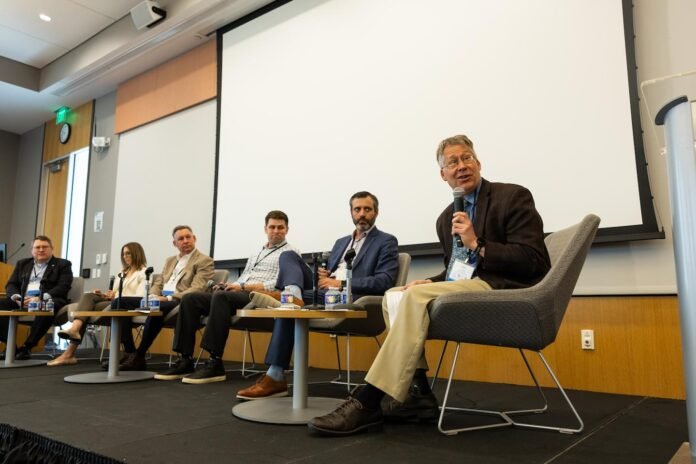At a gathering in Cambridge just down the street from MIT last week, dozens of entrepreneurs, investors, and policymakers debated how to keep the local innovation economy growing even as federal funding for many projects dries up.
“It is going to take collaborations, it is going to take tough conversations, we’re going to have to think about new models,” Emily Knight, chief executive at startup accelerator The Engine, told the group. The conference was the accelerator’s third annual meeting focused on “having Massachusetts be the best place for these companies to grow and scale,” Knight said.
A few days before, a group focused on ocean and climate tech-related startups met at the Joyce Cummings Center on the campus of Tufts University to discuss similar challenges.
Tufts president Sunil Kumar recalled the region’s success building tech and biotech startups around Route 128, but warned that many other states are trying to copy that model. To succeed now, innovators need to look more broadly and include more people from other parts of the state.
“It would be a shame if we recreated Route 128, which is literally a moat,” he said. Excluding some people from new economic opportunities “eventually catches up with you … as we are finding out the hard way.”
Like other speakers at both conferences, Kumar never mentioned President Trump by name, only alluding to the damage done by the new administration’s deep cuts to local research efforts.
For the combination of “blue” and “green” tech startups, which Kumar dubbed the “teal economy,” he recommended looking to pockets of strength in other areas beyond Greater Boston. New Bedford has a thriving fishing port, he noted.
Andrew Hargens, chief development officer at Massport, made the point that the region needs to better educate the startup community about strengths and opportunities right in their backyard.
A local startup making robots for processing seafood needed to partner with a distributor and ended up connecting with one in far away Alaska, he said. “We have 200 companies within 600 yards,” he said at the Tufts event. “They just didn’t know.”
Though the state’s famed academic institutions will continue to feed the talent base for tech startups, the high cost of living and doing business in Massachusetts remains an impediment to building big companies here, Jay Ash, chief executive of the Massachusetts Competitive Partnership, said at the Engine event.
Advocates of Massachusetts “can’t just show up anymore with Harvard and MIT behind you and [tell founders] you ought to be here,” Ash said. He praised recent state legislative efforts to speed up permitting for commercial development. “We’re starting to be more aggressive,” he said.
Joe Rodden, cofounder and chief executive of sustainable aviation fuel startup Lydian Labs, said the company built its pilot plant in North Carolina due to the lengthy permitting process and high cost of electricity in Massachusetts. That meant engineers had to waste time flying back and forth from Lydian’s Cambridge headquarters.
“We will add 40 to 50 jobs in Massachusetts, but we want to create thousands in the future,” Rodden said.
Despite the challenges, the state’s successes have generated powerful resources to keep the innovation sector growing. Both recent meetings took place within modern, airy facilities funded with the fruits of prior tech booms.
The $90 million Cummings Center was backed by a gift from Bill and Joyce Cummings, who made their fortune in suburban commercial real estate during the Route 128 tech boom. The Engine’s conference space is inside a https://www.bostonglobe.com/2022/09/29/business/tough-tech-vc-firm-engine-expands-bigger-offices-cambridge/ that now houses more than 100 early stage startups.
“This place in many ways is an optimism battery where you can come to get recharged,” Ben Downing, chief growth officer at The Engine, said. “If you invent something in Massachusetts, you ought to be able to make it in Massachusetts.”
Aaron Pressman can be reached at aaron.pressman@globe.com. Follow him @ampressman.






